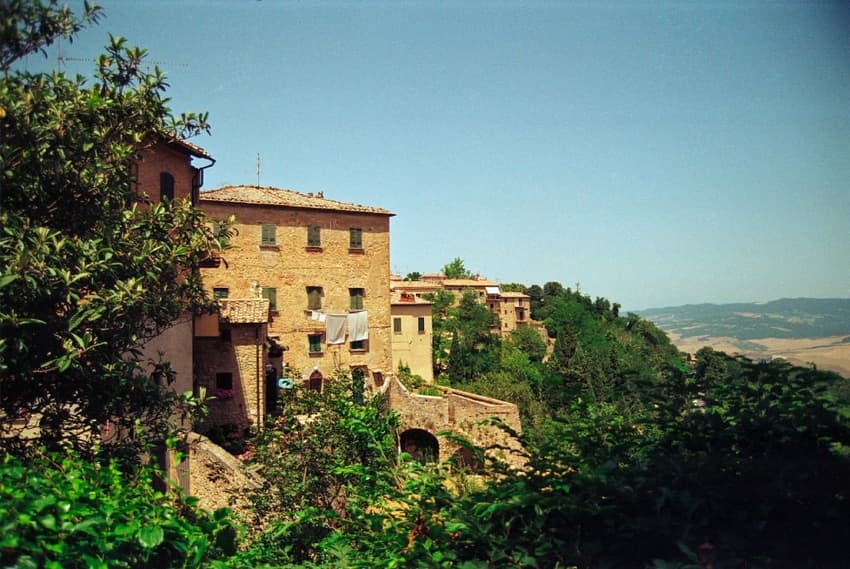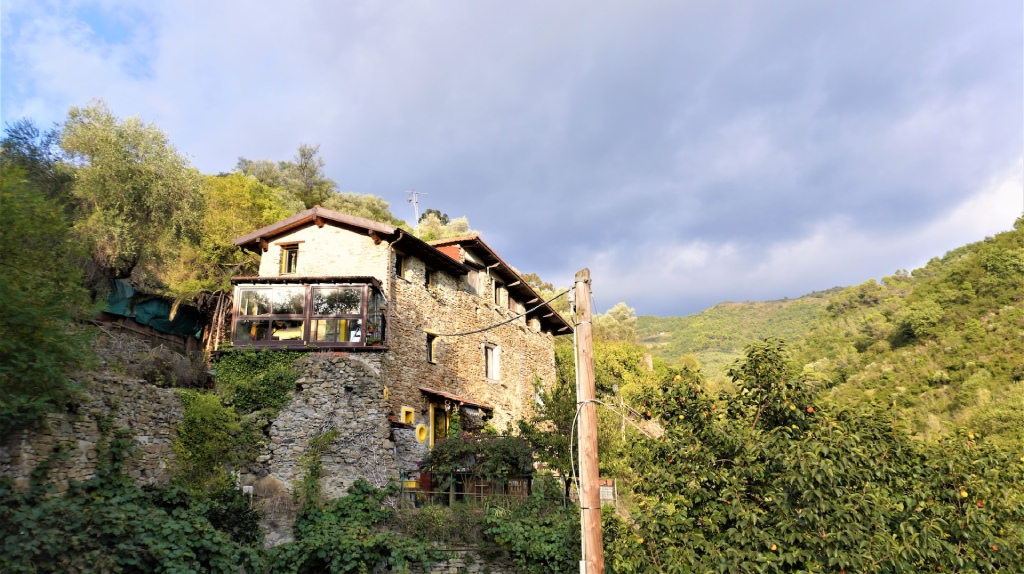Sheds and sewage: How neighbour disputes complicate life in Italy

Living in the Italian countryside is the dream of a lifetime for many, but land disputes with neighbours can quickly turn even the most positive of experiences into a nightmare. Share you own tales in the comments section below.
Relocating to the Italian countryside isn’t always as bucolic and peaceful as it may seem, especially when you face border issues with neighbours.
In towns and cities, you can often refer disputes between neighbours - over, say, dogs barking at night or bike storage - to the administration of your condominio. But in rural areas people are left fending for themselves amid labyrinthine regulations dating back centuries.
Mary Johnson, a 75-year-old American-British retired widower from New York last year bought a property north of Frosinone. It’s a semi-detached house where she shares the western border wall with her Italian neighbour.
Johnson complains she only found after she bought the three-bedroom home for €250,000 that a piece of her garden “unfairly falls inside her neighbour’s orchard” and wants to claim it back, but it’s not that simple.
“This was originally one huge farmhouse built in the 1960s, then in 1980 it was split into two semi-detached villas. An arbitrary fence was pulled up to separate the properties, notifying the local land registry to update the catasto (cadastral plan), which has been done. But I can’t change it”, says Mrs Johnson.
The fence runs straight down her slanted garden all the way to the woods, but at a certain point it deviates for some 20 square metres into her neighbour’s land, where he has built a greenhouse.
“I know it might sound silly, but I want that little patch of garden back inside my property fence. Unfortunately, I’m told by lawyers I have hired that even though the map of the entire two-villa property shows it belongs to me, there is a previous law, dating back to ancient Roman and medieval times, that grants him the right to use that piece of land”, she says.
READ ALSO: How to avoid hidden traps when buying an old property in Italy
The law is called ‘diritto di passaggio’ (right of passage or use), and according to her lawyers, as no other owner previously raised the issue, letting the neighbour use that bit of land as he wished, she can’t take it back unless she buys it for an estimated €6.000-€8.000.
“The land of this farmhouse, when divided to be sold as two detached properties, was unevenly split to his advantage as his relatives belonged to the original shepherd family who first built it.
“I’d like to drag him to court to fix the issue, but my lawyers say it would be a long, expensive trial lasting about eight years with no guarantee of victory”, says Johnson.

Land disputes are by no means rare in the Italian countryside and are often complicated by centuries-old regulations. Photo by Dan Hadar on Unsplash
In addition, by means of the ‘diritto di passaggio’ her neighbour could even insist on using a wooden shed in her side of the garden, where there’s an empty henhouse.
Along the fence unevenly dividing the two homes, there’s a small iron gate which allowed her neighbour to step into her garden to use the shed. She permanently sealed it a few months ago when he threatened to use the henhouse if she continued to complain about the land dispute.
“It’s a nightmare, I should have dug deeper before buying the house, now I’ll have to live with this and find a compromise with my neighbour”.
Paul Bernard, a 70-year-old French pensioner from Nice with a rural villa in Arezzo’s countryside, faces an even more unpleasant neighbour dispute: he has to share the sewage pipe, and annual draining costs, with the family next door.
The original property, built as one single farmhouse in 1955, was then divided into two detached units (villette bifamiliari), but the sewage system serving both remained just the one on Mr.Bernard’s side, running into his garden.
According to a law called ‘diritto di servitu’ (right of service), dating from ancient Roman times, his neighbour is entitled ‘in perpetuity’ to use the sewage pipe, as it is the original one built with the old farmhouse.
READ ALSO: The red flags to watch out for when buying an old house in Italy
“I did know about this but was hoping to have a cooperative, friendly neighbour,” he says. “We should share yearly costs of cleaning the sewage pipe, €700 per year, but he’s always late to contribute his €350, saying he’s facing hard times with five kids. So I need to take care of it, pay the drainage company, organise the cleaning and wait for him to pay me back when he can.”
Lawyers have told Bernard that the only way to get rid of this ‘diritto di servitu’ would be to pay to build his neighbour a new sewage pipe, which would cost roughly €15,000.
“If I cut him off without providing him with an alternative pipe, I could get sued, also by the local town hall for putting environmental health at risk.”
Before buying old rural properties, it's always best to spend some time doing research, contacting the town halls and land registries, and talking to neighbours as well, to avoid facing similar issues.
Often, even though it may be expensive, hiring a local lawyer with extensive knowledge of rural laws can be worthwhile.
Do you have your own bad experience of a neighbourly dispute in Italy? Share you own tales in the comments section below or email us at [email protected]
Comments (1)
See Also
Relocating to the Italian countryside isn’t always as bucolic and peaceful as it may seem, especially when you face border issues with neighbours.
In towns and cities, you can often refer disputes between neighbours - over, say, dogs barking at night or bike storage - to the administration of your condominio. But in rural areas people are left fending for themselves amid labyrinthine regulations dating back centuries.
Mary Johnson, a 75-year-old American-British retired widower from New York last year bought a property north of Frosinone. It’s a semi-detached house where she shares the western border wall with her Italian neighbour.
Johnson complains she only found after she bought the three-bedroom home for €250,000 that a piece of her garden “unfairly falls inside her neighbour’s orchard” and wants to claim it back, but it’s not that simple.
“This was originally one huge farmhouse built in the 1960s, then in 1980 it was split into two semi-detached villas. An arbitrary fence was pulled up to separate the properties, notifying the local land registry to update the catasto (cadastral plan), which has been done. But I can’t change it”, says Mrs Johnson.
The fence runs straight down her slanted garden all the way to the woods, but at a certain point it deviates for some 20 square metres into her neighbour’s land, where he has built a greenhouse.
“I know it might sound silly, but I want that little patch of garden back inside my property fence. Unfortunately, I’m told by lawyers I have hired that even though the map of the entire two-villa property shows it belongs to me, there is a previous law, dating back to ancient Roman and medieval times, that grants him the right to use that piece of land”, she says.
READ ALSO: How to avoid hidden traps when buying an old property in Italy
The law is called ‘diritto di passaggio’ (right of passage or use), and according to her lawyers, as no other owner previously raised the issue, letting the neighbour use that bit of land as he wished, she can’t take it back unless she buys it for an estimated €6.000-€8.000.
“The land of this farmhouse, when divided to be sold as two detached properties, was unevenly split to his advantage as his relatives belonged to the original shepherd family who first built it.
“I’d like to drag him to court to fix the issue, but my lawyers say it would be a long, expensive trial lasting about eight years with no guarantee of victory”, says Johnson.

In addition, by means of the ‘diritto di passaggio’ her neighbour could even insist on using a wooden shed in her side of the garden, where there’s an empty henhouse.
Along the fence unevenly dividing the two homes, there’s a small iron gate which allowed her neighbour to step into her garden to use the shed. She permanently sealed it a few months ago when he threatened to use the henhouse if she continued to complain about the land dispute.
“It’s a nightmare, I should have dug deeper before buying the house, now I’ll have to live with this and find a compromise with my neighbour”.
Paul Bernard, a 70-year-old French pensioner from Nice with a rural villa in Arezzo’s countryside, faces an even more unpleasant neighbour dispute: he has to share the sewage pipe, and annual draining costs, with the family next door.
The original property, built as one single farmhouse in 1955, was then divided into two detached units (villette bifamiliari), but the sewage system serving both remained just the one on Mr.Bernard’s side, running into his garden.
According to a law called ‘diritto di servitu’ (right of service), dating from ancient Roman times, his neighbour is entitled ‘in perpetuity’ to use the sewage pipe, as it is the original one built with the old farmhouse.
READ ALSO: The red flags to watch out for when buying an old house in Italy
“I did know about this but was hoping to have a cooperative, friendly neighbour,” he says. “We should share yearly costs of cleaning the sewage pipe, €700 per year, but he’s always late to contribute his €350, saying he’s facing hard times with five kids. So I need to take care of it, pay the drainage company, organise the cleaning and wait for him to pay me back when he can.”
Lawyers have told Bernard that the only way to get rid of this ‘diritto di servitu’ would be to pay to build his neighbour a new sewage pipe, which would cost roughly €15,000.
“If I cut him off without providing him with an alternative pipe, I could get sued, also by the local town hall for putting environmental health at risk.”
Before buying old rural properties, it's always best to spend some time doing research, contacting the town halls and land registries, and talking to neighbours as well, to avoid facing similar issues.
Often, even though it may be expensive, hiring a local lawyer with extensive knowledge of rural laws can be worthwhile.
Do you have your own bad experience of a neighbourly dispute in Italy? Share you own tales in the comments section below or email us at [email protected]
Join the conversation in our comments section below. Share your own views and experience and if you have a question or suggestion for our journalists then email us at [email protected].
Please keep comments civil, constructive and on topic – and make sure to read our terms of use before getting involved.
Please log in here to leave a comment.